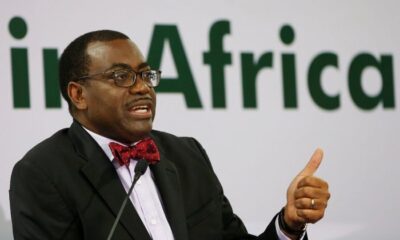Business
Wema Bank Continues to Sustain Growth
Published
8 years agoon

- Wema Bank Continues to Sustain Growth
There is no doubt that the Nigerian banking sector has been facing some challenges due to weakness in the country’s macroeconomic indices.
From a decline in the quality of assets in the industry, to rising non-performing loans (NPLs) ratio, decline in core liquid assets, among others, some banks have been struggling to weather the storm.
Fitch Ratings recently noted that the banking industry will remain challenging considering low oil prices, continued disruptions in oil production and constraints regarding the forex liquidity. As such, the industry could witness a rise in non-performing loan (NPL) ratios, though Fitch expects banks to remain profitable in 2016.
However, the rating agency affirmed Wema Bank’s Long-term National Rating of Wema Bank at BBB-. This, the agency said was reflective of the bank’s stable outlook and continued viability, in spite of the challenging macro-economic environment. The Long-term IDR of Wema Bank also remained Stable at B-, as the rating was driven by the bank’s VR. It stated that it does not expect any material change in the bank’s intrinsic creditworthiness.
Wema Bank’s strengths, which underpin its long and short-term ratings, include the bank’s strong risk management culture, low NPL exposure and good liquidity levels.
Managing Director of Wema Bank, Mr. Segun Oloketuyi, stated that the rating was an affirmation of the bank’s continued transformation, risk culture and positioning, as one of the major players within Nigeria’s retail banking landscape. He said the bank’s affirmed rating further reinforced its resolve to remain a smarter and efficient bank, driven by innovation and technology.
The Journey So Far
The bank celebrated its 71st anniversary in May this year. Established on May 2, 1945 as Agbonmagbe Bank, the financial institution has undergone rapid transformation. Widely reputed as the longest surviving and most resilient indigenous Nigerian bank, Wema Bank Plc has over the years, diligently offered a fully-fledged range of value-adding banking and financial advisory services to the Nigerian public.
Incorporated in 1945 as a Private Limited Liability Company (under the old name of Agbomagbe Bank Limited) and commencing banking operations in Nigeria the same year, Wema Bank later transformed into a Public Limited Company (PLC) in April 1987 and was listed on the floor of the Nigerian Stock Exchange (NSE) in January 1990. On February 5, 2001, Wema Bank Plc was granted a universal banking licence by the Central Bank of Nigeria (CBN), thus allowing it over the years to provide the Nigerian public with diverse financial and business advisory services.
Wema Bank after staying for seven years as a regional bank decided to upgrade to a national bank and has rising from a negative position, to a profitable financial institution, despite the challenges in the industry.
In its 2016 half year financials, Wema bank reported an 11 per cent rise in profit and a 15 per cent rise in turnover. The bank delivered an Interest income of N20.2 billion, a 15 per cent increase from N17.5 billion in the first half of 2015, while its fee and commission income also jumped by 42.3 per cent, from N2.2 billion in the first half of 2015 to N3.1 billion in the first half of 2016. The bank also recorded a 13.7 per cent growth in total assets, from N344.64 billion in the first half of 2015 to N391 billion in the first half of 2016. Furthermore, its operating expenses grew marginally by 2.7 per cent.
“Six years ago, we took a decision to refocus the bank’s operations on its areas of strength and build a sustainable institution. We took advantage of the new licensing regime and applied for a regional authorisation with a pledge to expand in the near future, once the turnaround project was completed.
“The bank’s transformation was implemented in three phases -first to stabilise the bank, second to prepare the building blocks for growth and third to go for growth. We are now within the third phase of the transformation project,” Oloketuyi explained.
He added: “The 2016 financial year has been characterised by deceleration on a number of economic indicators coupled with increasing energy costs, intensified by rising inflation, all within a tough operating environment.
“In spite of these challenges, Wema Bank has been able to deliver a modest improvement in the first half of the year. We commence the second half of the year with a sense of cautious optimism; well aware that the economic fundamentals point to an economy heading for further slowdown, yet hopeful that additional fiscal initiatives will be implemented to stimulate growth.”
Capital Raising
The bank receyelp raised N50 billion tier-2 capital, by issuing a bond. The first tranche was N20 billion and the second tranche was N30 billion.
“In recapitalising an institution, what you need to watch out is your optimum capital. Sometimes, if you make it all tier-1, it may not just be the optimal that you need. So, sometimes you also need to have some dose of tier-2.
“In 2009 when we took over, we had a distressed institution and all indices pointed to that direction. As at December 2009, the audited financial statement showed a negative capital of N45 million and the bank was totally on its knees. The share of market we had then was less 0.6 per cent. Equipment and processes and the platforms we were running were obsolete and the core banking application we had which is the platform we use to serve our customers, was old to the level that it couldn’t be supported by those who supported them.
“The non-performing loan ratio was 89 per cent and the performance of the bank was poor. So, we came in and said we need to have a containment strategy to stop the bleeding and stabilise the bank. So, between 2010 and 2014, was largely to give life back to the bank.
“A distressed bank needs to be turned around to a performing bank. Of course, you need capital for any business, more so for banking which is a regulated business. So, the first major assignment we did was to recapitalise the bank. Today we have been able to completely turn around the bank,” Oloketuyi explained.
Promoting Financial Inclusion
In its bid to promote financial include, Wema Bank in collaboration with Etisalat Nigeria recently collaborated to introduce the ‘WemaEasySavers,’ a tier-1 savings account, targeted at youths. The USSD based account is a seamless process where existing Etisalat customers can open instant account by dailing *945*10# and can be used instantly for transactions of up to N30,000 daily. However, it can be upgraded any time to other account types that give higher transaction limits.
Speaking at the launch, Oloketuyi said the initiative marked the beginning of greater things to come and greater services in Wema bank as the bank forges ahead with its growth strategy. He also said the bank has been stabilised and on the path of growth, and has invested a lot on technology which positioned it to receive this strategic partnership with Etisalat.
Is the CEO and Founder of Investors King Limited. He is a seasoned foreign exchange research analyst and a published author on Yahoo Finance, Business Insider, Nasdaq, Entrepreneur.com, Investorplace, and other prominent platforms. With over two decades of experience in global financial markets, Olukoya is well-recognized in the industry.

You may like
-
Nigeria Joins BRICS as Partner Country, Strengthening Global South Cooperation
-
70 Million Poorest of The Poor Nigerians To Get N75,000 From FG
-
Nigeria Surpasses OPEC Quota with 1.51 Million bpd, Targets 2.06 Million in 2025
-
Global Investors Commit $7.6 Billion to Nigeria’s Development at AIF 2024
-
Nigeria-China Trade Strengthened as Grimaldi Introduces Direct Shipping Line
-
Nigeria’s GDP Records 3.46% Growth in Q3 Spurred by Non-Oil Sector













